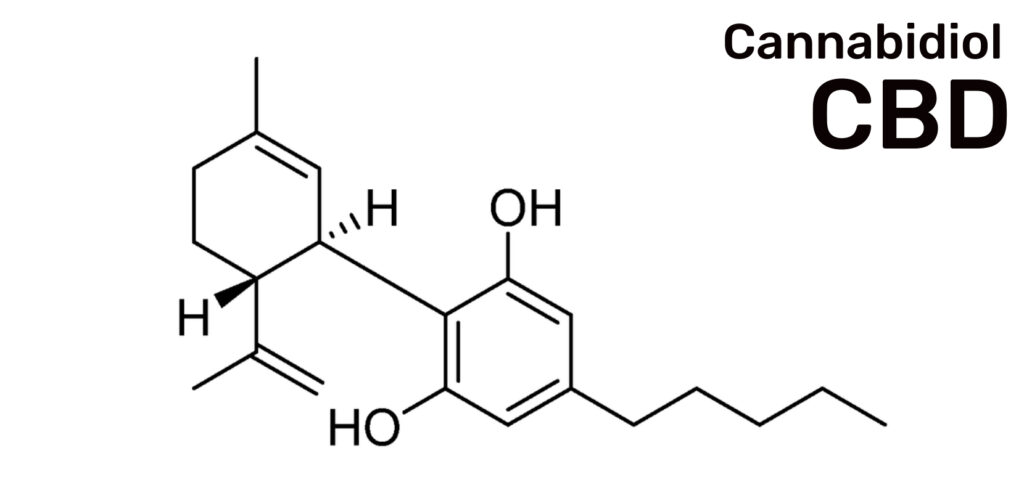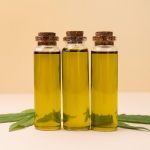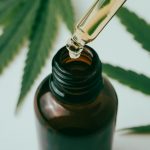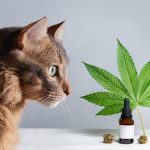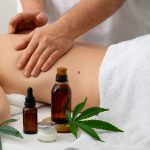Cannabidiol, known as CBD, is one of over 100 active compounds found in the cannabis plant species. This natural substance is widely used in supplements, food, cosmetics, and medicine. However, it differs from its sister compound, tetrahydrocannabinol (THC), which is known for its psychoactive properties. THC is the main psychoactive substance in cannabis, responsible for the euphoria usually associated with cannabis use. On the other hand, CBD has no psychoactive effects and does not cause feelings of intoxication. This substance is considered safer and does not cause addiction.
Recently, CBD has received significant attention as a potential treatment for various diseases and conditions. It is used to reduce pain, inflammatory reactions, anxiety, depression, and other mental states.
Definition of cannabidiol (CBD)
CBD is a natural chemical compound, known as a cannabinoid, found in Cannabis plants. It is one of over 100 cannabinoids found in these plants and is the second most common active component of cannabis after tetrahydrocannabinol (THC). However, unlike THC, CBD has no psychoactive properties, i.e., it does not cause a “stoned” or “high” state associated with marijuana.
CBD is produced from industrial hemp, which contains insignificant amounts of THC, so CBD-based products do not cause psychoactive effects. It can be extracted and processed into various products, including oils, creams, capsules, and others.
Difference Between Cannabis And Hemp
Cannabis and hemp both belong to the genus Cannabis, but their use, chemical composition, and legislative norms differ. Cannabis, often known as marijuana, is typically used for recreational or medical purposes due to its high THC content, a psychoactive cannabinoid. Depending on the strain, cannabis can contain from 5% to 20% THC, and some strains can contain up to 30% THC.
Hemp, on the other hand, is a variety of Cannabis sativa, which was specifically bred for industrial use. It has a high CBD content but low THC content (usually less than 0.3%). This makes hemp ideal for producing a wide range of products, including CBD oils, textiles, building materials, biofuels, food products, and many others.
Is Cannabidiol The Same As Marijuana?
Although CBD and marijuana are both components of the Cannabis plant, they are not the same. Marijuana is a type of Cannabis plant that includes various strains and is known for its psychoactive properties, mainly provided through the presence of THC.
Cannabidiol, on the other hand, is one of over 100 cannabinoids found in Cannabis plants, and it does not have psychoactive properties associated with THC. This means that CBD use does not cause a “stoned” or “high” state often associated with marijuana.
Furthermore, CBD is often produced from industrial hemp, a variety of Cannabis sativa, which has a high CBD content and low THC content. This distinguishes it from marijuana, which has a high THC content. Thus, while CBD and marijuana are both products of the Cannabis plant and have some common properties, they differ in their chemical structure, effects on the body, and legal status.
Source and production of cannabidiol
Cannabidiol (CBD) is a chemical substance found in Cannabis sativa plants, including both main types: hemp and marijuana. However, industrial hemp, which has a high CBD content and a low THC content, is usually used for CBD production.
Where is cannabidiol obtained from?
Cannabidiol (CBD) is obtained from industrial hemp, a variety of Cannabis sativa. This plant is characterized by a high CBD content and a low tetrahydrocannabinol (THC), psychoactive cannabinoid, content.
Production process of cannabidiol
The production process of cannabidiol (CBD) starts with the extraction stage. After the harvest is collected, industrial hemp plants are processed to extract CBD. This usually happens using a solvent extraction method, such as ethanol or CO2.
CO2 extraction is especially popular because it allows for a high degree of control and selectivity. Under high pressure and low temperature, carbon dioxide is used to isolate, separate, and preserve the purity of CBD.
After extraction, CBD undergoes a “winter purification” process. This process removes waxes, lipids, and chlorophyll that may be present in the final product. The result is pure CBD, which can then be used to produce various products, including oils, tinctures, capsules, creams, and more.
How cannabidiol works in the body
Cannabidiol (CBD) interacts with the body through the endocannabinoid system (ECS), which is part of the central nervous system and plays a crucial role in regulating various physiological processes, including mood, appetite, pain, and sleep.
How does cannabidiol work in the body?
CBD interacts with the endocannabinoid system, a key regulatory network that controls a range of physiological processes. It does not directly activate cannabinoid receptors CB1 and CB2, but it modulates their activity, influencing the way other cannabinoids interact with them. In addition, CBD can influence the level of anandamide, an endogenous cannabinoid known for its anti-inflammatory and analgesic properties, by inhibiting its breakdown. It can also interact with various other receptors in the body, such as the serotonin receptor 5-HT1A, which plays a role in regulating mood and anxiety.
Interaction of cannabidiol with the endocannabinoid system
The endocannabinoid system (ECS) is an essential part of human physiology that regulates a number of key processes. It consists of cannabinoid receptors, including CB1 and CB2, as well as endocannabinoids produced by the body, and enzymes that synthesize and break them down.
CBD interacts with the endocannabinoid system, but its mechanism of action differs from most other cannabinoids. It does not bind directly to cannabinoid receptors, but acts as a modulator, altering the way other cannabinoids interact with these receptors.
One of the key ways CBD interacts with the ECS is by inhibiting the breakdown of anandamide, an endogenous cannabinoid. This leads to increased levels of anandamide in the body, which can have a positive impact on mood, pain, and other aspects of health.
In addition, some studies have shown that CBD can have a direct interaction with other types of receptors, such as serotonin receptors, which play a significant role in regulating mood and anxiety. This might explain why CBD is often used to reduce symptoms of anxiety and depression.
Benefits and potential beneficial properties of cannabidiol
Cannabidiol, known as CBD, is one of over 100 cannabinoids discovered in Cannabis sativa. It has been the subject of numerous scientific studies due to its potential therapeutic properties.
CBD is being investigated in various contexts, including its potential ability to reduce pain, decrease anxiety, protect nerve cells from damage, and improve sleep quality. These potential benefits are promising, but they still require further research.
It’s important to note that the use of CBD should be discussed with a healthcare professional, especially if you are already taking other medications.
General Overview of Cannabidiol Benefits
Here are some of the potential therapeutic properties of CBD that are being studied:
- Anti-inflammatory properties: Studies have shown that CBD may have anti-inflammatory properties, which could be beneficial for treating chronic inflammatory conditions like arthritis.
- Pain reduction: CBD is often used for pain reduction, especially in chronic conditions like fibromyalgia and multiple sclerosis.
- Anxiolytic properties: Some studies have shown that CBD may reduce anxiety symptoms, making it potentially beneficial for people with anxiety disorders.
- Antipsychotic properties: Preliminary research has shown that CBD may have antipsychotic properties, which could be beneficial for people with mental disorders such as schizophrenia.
- Neuroprotective properties: Some studies suggest that CBD may have neuroprotective properties, which could help protect nerve cells from damage.
- Sleep support: CBD is also being studied for its potential ability to improve sleep quality, reduce insomnia, and other sleep disorders.
Anti-Inflammatory Properties of Cannabidiol
Cannabidiol (CBD) is being studied for its potential anti-inflammatory properties. Inflammation is the body’s natural response to injury or infection, but chronic inflammation can cause permanent damage and be associated with various diseases, including cardiovascular diseases, cancer, and autoimmune disorders.
CBD may influence inflammation by interacting with the endocannabinoid system (ECS), which includes a network of receptors, endocannabinoids, and enzymes that regulate various physiological processes, including the response to inflammation.
One of the main ways CBD may influence inflammation is by inhibiting the breakdown of anandamide, an endogenous cannabinoid known for its anti-inflammatory properties. This leads to an increase in anandamide levels in the body, which can have an anti-inflammatory effect.
Additionally, some research shows that CBD may influence the activity of cytokines, proteins that play a key role in inflammatory processes. CBD may reduce the production of pro-inflammatory cytokines and stimulate the production of anti-inflammatory cytokines, which can help reduce inflammation.
It’s important to note that while these results are promising, further research is needed to fully understand the anti-inflammatory properties of CBD and their potential use in medicine.
General Overview of Cannabidiol Side Effects
Cannabidiol (CBD) is generally considered safe to use, but like any active biological agent, it can have some side effects. However, it’s worth noting that these effects are not universally experienced and may not occur in all people. Some potential side effects may include fatigue, gastrointestinal disorders, changes in appetite and weight, dry mouth, and a slight drop in blood pressure. These effects are usually temporary and may decrease over time or with a decrease in dosage. The response to CBD can vary depending on the individual, dosage, and form of administration.
Potential Risks and Side Effects
Despite cannabidiol (CBD) generally being considered safe, it can have some side effects and potential risks. Here are some of them:
- Side effects: The most common side effects include fatigue, diarrhea, changes in appetite, and changes in weight. These effects are usually temporary and may decrease over time or with a decrease in dosage.
- Drug interactions: CBD can interact with some medications, particularly those used for lowering blood pressure, as well as some antidepressants and anticoagulants. This can increase the risk of side effects or alter the effectiveness of these medications.
- Risk of dependency: Although CBD is not considered addictive, some people may develop a psychological dependency on its use, especially if they use it to reduce anxiety or pain.
Quality and purity of products: The quality and purity of CBD products can greatly vary depending on the manufacturer. Some products may contain significantly less CBD than stated on the label, or contain harmful impurities such as heavy metals or pesticides.
Cannabidiol Interaction with Other Medications
Cannabidiol (CBD) can interact with some medications, which requires caution when using it. This interaction happens because of CBD’s impact on the cytochrome P450 (CYP450) system, a group of enzymes in the liver that play a key role in the metabolism of most drugs.
CBD can inhibit some enzymes of this system, including CYP3A4 and CYP2D6. This can alter the rate at which these enzymes break down drugs in the body, which can increase the level of these drugs in the blood and increase the risk of side effects.
Some medications that can interact with CBD include benzodiazepines, statins, anticoagulants, and antidepressants. It’s important to note that this is not a complete list of medications that can interact with CBD, so you should always consult with your doctor or pharmacist before starting to use CBD, especially if you are already taking other medications.
Potential Dangers of High Doses of Cannabidiol
High doses of cannabidiol (CBD) can carry certain risks and negative consequences. Despite the general safety of CBD, large doses can cause more intense adverse reactions and potentially interact with other medications.
- Adverse reactions: Increased doses of CBD can cause more pronounced adverse reactions, including fatigue, diarrhea, changes in appetite, and weight. In rare cases, large doses of CBD may also cause dry mouth, low blood pressure, and dizziness.
- Interaction with medications: Increased doses of CBD can increase the risk of interaction with other medications, especially those metabolized through the cytochrome P450 system in the liver. This can increase the levels of these medications in the blood and increase the risk of adverse reactions.
- Liver toxicity: Some animal studies indicate that extremely high doses of CBD can cause liver toxicity. However, additional research is needed to determine whether this also occurs in humans.
It’s important to remember that the optimal dose of CBD may vary depending on the individual, health condition, and other factors. You should always consult with your doctor or pharmacist before starting to use CBD, especially if you plan to take large doses.
Risk of dependence or withdrawal when using cannabidiol
Cannabidiol (CBD) does not cause physical dependence that is characteristic of some other cannabinoids such as tetrahydrocannabinol (THC). CBD does not induce a “high” or euphoric effect that is typically associated with marijuana and other cannabis products containing THC.
However, while CBD does not cause physical dependence, psychological dependence is possible. People who use CBD to reduce symptoms such as pain or anxiety may experience an increase in these symptoms if they stop taking CBD. This can lead to a feeling that they can’t cope without CBD, which can be a form of psychological dependence.
Regarding withdrawal syndrome, studies have shown that there is a small likelihood of its occurrence when discontinuing CBD use, unlike many other psychoactive substances. However, if a person suddenly stops using CBD, they may experience a return of symptoms they tried to control with CBD, such as anxiety or pain.
It is important to remember that the use of CBD, like any other medicine or supplement, should be discussed with a healthcare professional.
Use of cannabidiol products
Cannabidiol (CBD) is an active component made from hemp, and it has found wide use in various products. It is used to create a variety of products including oils, tinctures, capsules, food, beverages, creams, lotions, and more. It’s important to consider that the effectiveness of CBD can vary depending on the product form and the method of consumption.
Types of products containing cannabidiol
Cannabidiol (CBD) products are available in different forms, allowing people to choose the option that best suits their needs and circumstances. Here are a few main forms of CBD products:
- Oils and tinctures: This is the most common form of CBD. They are made by mixing CBD with a carrier, such as coconut oil or alcohol. CBD oils and tinctures are typically taken internally, by dropping them under the tongue.
- Capsules and tablets: CBD is also available in the form of capsules or tablets, which can be taken internally. This can be a convenient option for people who are looking for a more discreet or convenient way to take CBD.
- Food and beverages: CBD can be added to various foods and beverages, including baked goods, coffee, and tea. This can be a pleasant way to take CBD, but the effectiveness may vary depending on the preparation method and other ingredients.
- Creams and lotions: CBD can be used topically in the form of creams, lotions, or balms. This can be particularly helpful for treating localized painful or inflammatory conditions, such as arthritis or eczema.
- Vaping and smoking: CBD can be inhaled by vaping or smoking. This method allows CBD to quickly enter the bloodstream, but it may also have side effects associated with inhaling smoke or vapor.
- CBD products for pets: CBD is also available in forms intended for pets, such as snacks or tinctures that can be added to food or water.
It’s important to note that the quality and purity of CBD products can vary, so it’s important to choose products from reputable manufacturers. Always consult with a healthcare professional before starting to use CBD.
Recommendations for choosing CBD products
When choosing cannabidiol (CBD) products, it’s important to consider several key factors to ensure safety and effectiveness:
- Hemp source: Choose products made from hemp grown without the use of pesticides and other harmful chemicals. Manufacturers who use organic hemp usually indicate this on their websites or product packaging.
- Extraction method: CO2 or ethanol extraction methods are considered the safest and most effective for CBD production. They ensure high purity of the extract and minimize the risk of solvent residues.
- Third-party testing: Reliable CBD manufacturers usually provide third-party testing reports that confirm the CBD concentration as well as the absence of harmful substances such as pesticides, heavy metals, and mold forms.
- CBD type: Choose between CBD isolate (pure CBD without other cannabinoids), broad-spectrum CBD (contains all cannabinoids except THC), or full-spectrum CBD (contains all cannabinoids including THC). Your choice depends on your individual needs and the legislation of your country regarding THC.
- Dosage: Choose a product that allows for easy dosage control. This is especially important for beginners who might want to start with a low dose and gradually increase it.
- Brand and reviews: Choose products from reliable brands with positive user reviews. Reviews can help you understand how other people use the product and what results they have achieved.
Always consult with a healthcare professional before starting to use CBD, especially if you are already taking other medications.
Determining the correct dosage of cannabidiol
When determining the dosage of CBD, it’s important to start with a low dose, for example, 5-10 mg of CBD per day, and gradually increase the dose by 5-10 mg every 3-7 days until the desired effect is achieved. It’s important to listen to your body and track any changes in well-being during CBD intake. This can help you determine whether you need to increase or decrease the dose.
More about determining the CBD dose
Determining the optimal dose of cannabidiol (CBD) requires an individual approach as it depends on a number of factors, including personal tolerance, usage goals, the form of the CBD product, as well as the weight and overall health condition of the user.
The process of determining the correct CBD dosage may include the following steps:
- Starting with a low dose: It is usually recommended to start with a low dose of CBD and gradually increase it until the desired effect is achieved.
- Monitoring your body’s response: It’s important to listen to your body and track any changes in well-being during CBD intake.
- Considering the form of the CBD product: Different forms of CBD products can have different bioavailability, which affects how much CBD your body can use.
- Consulting with a healthcare professional: This is especially important if you are already taking other medications, as CBD can interact with some drugs.
Using Cannabidiol for Oral Health
Cannabidiol (CBD) is being studied as a potential means of supporting oral health. Although additional research is needed for a full understanding of its effects, there are several ways in which CBD may impact oral health:
- Anti-inflammatory properties: CBD is known for its anti-inflammatory properties which may help reduce inflammation and pain associated with conditions like periodontitis.
- Antibacterial properties: Some research suggests that CBD may have antibacterial properties which could help combat bacteria that cause the formation of dental plaque and cavities.
- Pain reduction: CBD is already used to reduce pain in various conditions, and this could include pain in the oral cavity caused by conditions like tooth extraction or mouth ulcers.
- Reducing dry mouth: While CBD may cause dry mouth in some people, other research suggests it can stimulate salivary glands which could help reduce dry mouth.
It’s important to note that while these potential benefits are promising, additional research is needed to confirm the effectiveness of CBD for oral health. Moreover, it’s important to consult with your dentist or another healthcare professional before using CBD for oral health.
Legal Restrictions on CBD Sale
The legal restrictions on the sale of cannabidiol (CBD) vary depending on the country, region, and even from state to state within the US. Here are a few key factors to consider:
- Hemp and marijuana legislation: In some countries, such as the US, CBD made from hemp (i.e., plants that contain less than 0.3% THC) is legal at the federal level. However, CBD made from marijuana (i.e., plants that contain more than 0.3% THC) may be illegal in some states.
- CBD product regulation: In some countries, CBD products are regulated as medicines, which requires manufacturers to obtain a special permit to sell them. In other countries, CBD products may be available as food products or dietary supplements.
- International agreements: International agreements, such as the Single Convention on Narcotic Drugs of 1961, may impact CBD legislation in individual countries. For example, this convention prohibits the use of hemp for recreational purposes, but allows it for medical and scientific purposes.
- Labeling legislation: CBD product manufacturers must comply with labeling requirements that are established in each country. This may include requirements to indicate CBD concentration, potential side effects, and other important information.
It’s important to note that this information can change rapidly, as many countries are actively reviewing their CBD legislation. Therefore, it’s always worth consulting with a lawyer or another legal professional to get the latest and most accurate information about legal restrictions on the sale of CBD.
